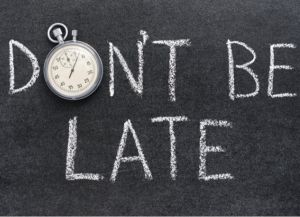On the Hidden Costs of
Being "Fashionably" Late to your Wedding
by Jennifer
Cram Marriage Celebrant © (31/01/2019)
Categories: Wedding Traditions | Wedding Budget |
< previous |
contents
|
next
>Categories: Wedding Traditions | Wedding Budget |
 Throughout our lives the importance of
being on time is stressed - at home, at school, at
work. And we learn that, not only is it considered
impolite to be late, it can cost us – as anyone who
has been kept back after school or had a stern
talking to by their boss, or lost out on a job
because they turned up late for the interview or
were locked out of a concert or other event because
they arrived after start time, will know.
Throughout our lives the importance of
being on time is stressed - at home, at school, at
work. And we learn that, not only is it considered
impolite to be late, it can cost us – as anyone who
has been kept back after school or had a stern
talking to by their boss, or lost out on a job
because they turned up late for the interview or
were locked out of a concert or other event because
they arrived after start time, will know.Being late goes against other
community norms
It reinforces outdated gender
role stereotypes
"Fashionably late" is
sarcastic
It only made sense when women
were property
Curiously, wives only became, legally, their own complete person in the 1980s. And it was in the 1980s that the term "fashionably late" moved into common usage - minus the sarcasm.
It costs you, financially,
because you get less than you paid for
In calculating how much to charge you, the vendor will have worked out what quantity they will deliver as well as the spread of time over which they will deliver it.
For example, for a drinks package, the venue will have worked out how much booze and other beverages will be dispensed over that time, and priced the package accordingly. Imagine you’ve booked a 4 hour drinks package, but you turn up late, so serving of drinks has to be compressed into a 3 hour window. Your guests are going to drink 25% less, which means that you have paid 25% more per drink.
Some vendors might have a late-start fee. That's an extra expense that you probably did not budget for. In some situations you might face a fine if you go over the end time. For example, Brisbane City Council fines wedding styling companies if the chairs and other decor items are not set up and cleared away within the 2-hour period of the site booking. If your vendor is fined because of your lateness, they will likely bill you for that.
You miss out because you have
less time
If you are running late, your photographer may have to skip taking certain photos, and may miss emotional interactions with guests because you are being rushed off to the formal photos. Your ceremony might have to be cut short in order for your celebrant to meet other obligations. Some of your chosen music may not be played during the reception, guests would have less time for dancing, speeches might be cut short, and the food might be cold or overcooked because of a delayed start to the meal.
Net result: your guests might not be in the best of moods after being forced to sit and wait and wait for you to arrive and the ceremony to start, and then being rushed through everything that follows.
What could possibly be “fashionable” about all of that?
Thanks for reading!
